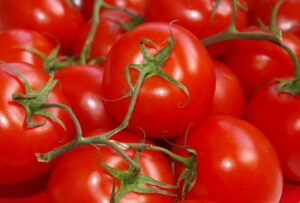
Ukraine increased tomato imports by 32.5% in 2025 compared to 2024, to 104,820 tons, according to the State Customs Service.
According to statistics, in monetary terms, tomato imports increased by 31.6% to $140.84 million.
The main imports of tomatoes in 2025 came from Turkey (82.3% of all supplies in monetary terms), Poland (7.3%), and the Netherlands (1.9%). A year earlier, Turkey accounted for 77.3%, Poland for 10.9%, and the Netherlands for 4.3%.
As reported, in July 2025, Ukraine introduced anti-dumping duties on imports of fresh tomatoes from Turkey at a rate of 26.9% for a period of five years.

US President Donald Trump announced his intention to raise tariffs on a number of goods from South Korea from 15% to 25%, linking this decision to the fact that, according to him, the country’s parliament had failed to fulfill its obligations under a previously agreed trade agreement. According to Reuters, Trump wrote on social media that the increased rates would apply to South Korean cars, lumber, pharmaceuticals, and other goods subject to “reciprocal tariffs.” However, the report did not specify when the increase would take effect.
The South Korean authorities were taken by surprise by the announcement and declared their commitment to implementing the agreements; emergency consultations were held in Seoul, and relevant officials are preparing to contact the American side.
Against the backdrop of the news, South Korea’s KOSPI index fell during trading, then reversed and closed higher, while the won weakened. Hyundai Motor and Kia shares ended the session lower after a more noticeable decline during the day.
We remind you that under the agreement reached in 2025, the tariff on imports of Korean cars and auto components to the US was previously reduced to 15% from 25% and came into effect on November 1
IMPORTS, SOUTH KOREA, TARIFFS, TRUMP, US

Uzbekistan has eliminated customs duties on imports of 82 types of raw materials and semi-finished products until January 1, 2027.
Zero rates for these types of products were first introduced in October 2021 and were valid until January 1, 2024.
The list includes, in particular: castor oil, asbestos, sodium hydroxide (caustic soda), dyes, artificial fur, artificial wax, ready-made adhesives, photo emulsion for textile printing, paper and cardboard, cotton fabrics, linen fabrics, fabrics made of artificial and synthetic fibers, glass fiber, glass fiber fabrics, loudspeakers, and others.
Measures to reduce customs duties were applied in order to support domestic manufacturing enterprises and increase exports of value-added products.
As a reminder, Uzbekistan previously extended zero customs duties for a number of food products and children’s clothing until January 1, 2027.
In addition, until January 1, 2031, special equipment, spare parts and components, raw materials and materials that are not produced in the country and are used in the technological processes of enterprises for the disposal of household, construction and medical waste, as well as the production of biodegradable polymer materials, are also exempt from customs duties.

Naftogaz Group increased electricity imports from Europe this week based on a government decision and with the aim of stabilizing the situation in the energy system, said Sergey Koretsky, chairman of the board of Naftogaz of Ukraine.
“The volume of imported electricity already covers more than 50% of the needs of all the Group’s enterprises, as provided for by the government’s resolution,” he said in a Facebook post on Saturday.
Koretsky explained that the corresponding amount of electricity has been allocated for the needs of domestic consumers.
“We are coordinating our actions with the government in order to stabilize the situation in the energy system as quickly as possible after the Russian shelling,” the chairman of the board of Naftogaz emphasized.
As reported, amid the deteriorating situation in Ukraine’s energy system due to massive Russian shelling of energy infrastructure, the government has instructed state-owned companies to increase electricity imports.
During the “Question Time to the Government” in the Verkhovna Rada on January 16, First Deputy Prime Minister of Energy Denys Shmyhal pointed out that, on behalf of the government, Naftogaz of Ukraine, Ukrzaliznytsia, and part of the industrial complex will import at least 50% of their electricity needs.
“This will make it possible to free up 1.5 MW for people’s needs. I hope this will happen in the coming days,” Shmyhal said at the time.

Imports of insulated wires and cables, including fiber optic cables, to Ukraine in 2025 increased by 24.3% compared to 2024, reaching $590.7 million, according to data from the State Customs Service.
The largest suppliers of wires and cables last year were Hungary ($153.4 million, or 26% of imports), China ($132.3 million, or 22.4%), and Poland ($94.4 million, or 16%). For comparison: in 2024, imports from Hungary amounted to $127.8 million, from Poland – $80 million, and from China – $75 million.
In December 2025, imports of these products decreased by 4.4% compared to December 2024, to $49.1 million.
According to the State Customs Service, in 2024, Ukraine increased imports of insulated wires and cables by 9.3% compared to 2023, to $475 million.

Imports of tin and tin products to Ukraine increased by 36.5% in 2025, reaching $4.352 million.
Tin exports, on the contrary, fell to $241,000 (compared to $389,000 in 2024).
In December, imports amounted to $290,000, exports — $89,000. Import growth was also observed in 2024 (+16.9%).
Tin is mainly used as a safe, non-toxic, corrosion-resistant coating in its pure form or in alloys with other metals. The main industrial applications of tin are in white tinplate (tinned iron) for the manufacture of food containers, in solders for electronics, in domestic piping, in bearing alloys, and in coatings of tin and its alloys. The most important tin alloy is bronze (with copper).